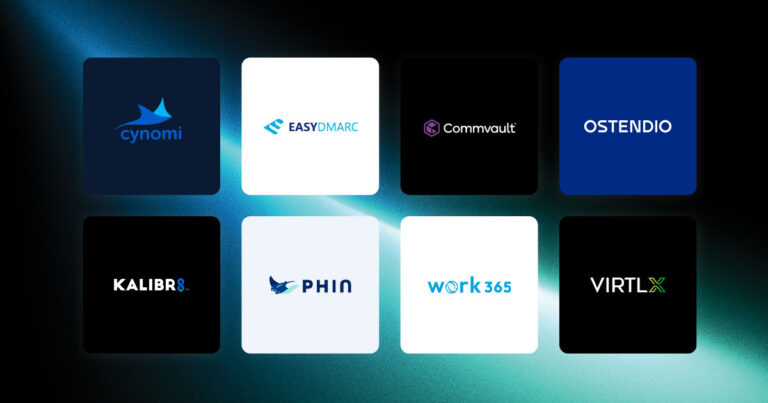Our partners reflect on the decisions that shaped their success as MSPs.
Running an MSP is no easy task. It requires wearing many different hats and gaining a lot of expertise across many different fields. At any stage as an MSP, you will likely find yourself having to make tough decisions about the future of your business — decisions that can be overwhelming without the right information.
But as you continue on your journey, you’ll come to recognize the value of learning from your peers. Fellow MSPs can offer a wealth of useful insights into the industry and help guide you during critical decisions.
That’s why we reached out to some of our partners and asked them to share their experiences as MSPs, from the best decisions they’ve made to the mistakes they wish they hadn’t. Below are their responses.
How did your MSP journey begin?
 Daniel Johnson, CEO of machineLOGIC (US): Since founding the company in 2001, I’ve grown machineLOGIC from a small consultancy to a thriving Microsoft Gold Partner.
Daniel Johnson, CEO of machineLOGIC (US): Since founding the company in 2001, I’ve grown machineLOGIC from a small consultancy to a thriving Microsoft Gold Partner.
 Dustin Cassar, Director of Technology and Business Development at Quicktech (Canada): I was hired as a junior technician for an in-home tech support company back in the late ‘90s. In the early 2000s — when the owners decided that they wanted to chase their dreams — I bought them out and captured mine.
Dustin Cassar, Director of Technology and Business Development at Quicktech (Canada): I was hired as a junior technician for an in-home tech support company back in the late ‘90s. In the early 2000s — when the owners decided that they wanted to chase their dreams — I bought them out and captured mine.
 Cole Halpin, Director of Avitus Group (US): Coming out of college, I had offers from a few places — primarily Internet service provider (ISP) companies and some local hospitals in the area. I knew that at an ISP, I’d be a small cog in a massive wheel and that the hospitals would offer a fairly static role with little obvious area for personal and career growth. With an MSP, I knew right away that I’d be able to grow at an accelerated pace and experience many avenues in IT quickly.
Cole Halpin, Director of Avitus Group (US): Coming out of college, I had offers from a few places — primarily Internet service provider (ISP) companies and some local hospitals in the area. I knew that at an ISP, I’d be a small cog in a massive wheel and that the hospitals would offer a fairly static role with little obvious area for personal and career growth. With an MSP, I knew right away that I’d be able to grow at an accelerated pace and experience many avenues in IT quickly.
 Allan Jocson, CEO of Agilitec IT (US): After several years as a systems engineer for an accounting firm, the owner told us that he no longer wanted to own the IT subsidiary that I was working for and informed us (there were four of us at the time) that he was going to make an offer to a local competitor to sell the book of business to them. It wasn’t highly profitable, and he just didn’t want the “headache” and risk of running an IT firm anymore, as it was more of a distraction to him. He made me an offer to stay on and to become the IT director of the accounting firm which I pondered for a quick second, but I knew I would quickly be bored with managing a single network.
Allan Jocson, CEO of Agilitec IT (US): After several years as a systems engineer for an accounting firm, the owner told us that he no longer wanted to own the IT subsidiary that I was working for and informed us (there were four of us at the time) that he was going to make an offer to a local competitor to sell the book of business to them. It wasn’t highly profitable, and he just didn’t want the “headache” and risk of running an IT firm anymore, as it was more of a distraction to him. He made me an offer to stay on and to become the IT director of the accounting firm which I pondered for a quick second, but I knew I would quickly be bored with managing a single network.
I changed course and asked him if he would sell me the book of business instead if I started my own IT firm. Instead of working for him directly, I could maintain his systems as a client of my new company. He ended up giving me all of the clients instead of making me buy them out and I will forever be indebted to him as that was a game-changing opportunity. I still look to him for advice — he is a business mentor to me and always will be. I formed the company and reached out to all of the clients to ask if they would move their contracts over to my new company. All but one of the clients took my offer. The remaining client that didn’t move over to what is now Agilitec IT, ended up coming over after a year.
 Cody Grace, President of Waypoint Digital Networks (US): I ran a small IT operation in the medical industry for many years. There was a clear deficit of qualified vendors in my area that could understand our basic needs and could pair that with a solution. My MSP started as a technology provider with the intent to understand our clients’ needs and tailor solutions to those needs. We have since moved to a standard solution stack that is scalable, but still keep a positive end user experience as the primary goal.
Cody Grace, President of Waypoint Digital Networks (US): I ran a small IT operation in the medical industry for many years. There was a clear deficit of qualified vendors in my area that could understand our basic needs and could pair that with a solution. My MSP started as a technology provider with the intent to understand our clients’ needs and tailor solutions to those needs. We have since moved to a standard solution stack that is scalable, but still keep a positive end user experience as the primary goal.
 James Ratcliffe, IT Manager at Gemini Group (UK): I was brought in as an IT field engineer for Gemini. After a company reshuffle, I was put in charge of our IT department and had the task of streamlining all our products and procedures.
James Ratcliffe, IT Manager at Gemini Group (UK): I was brought in as an IT field engineer for Gemini. After a company reshuffle, I was put in charge of our IT department and had the task of streamlining all our products and procedures.
 Zac Paulson, CEO of TrueIT (US): Our name, TrueIT, wasn’t an accident. When we founded the company, we saw a lot of IT companies shying away from the managed services model and the cloud. We set out to build a managed service-only IT company that led with the cloud. This was in 2012, so that was not as common as it is today. We’ve never installed a physical or virtual Exchange server since founding, and I don’t think we are far away from not needing physical servers either. There will likely always be edge servers, but it seems like those may become backups to the cloud instead of the other way around, as it was years ago.
Zac Paulson, CEO of TrueIT (US): Our name, TrueIT, wasn’t an accident. When we founded the company, we saw a lot of IT companies shying away from the managed services model and the cloud. We set out to build a managed service-only IT company that led with the cloud. This was in 2012, so that was not as common as it is today. We’ve never installed a physical or virtual Exchange server since founding, and I don’t think we are far away from not needing physical servers either. There will likely always be edge servers, but it seems like those may become backups to the cloud instead of the other way around, as it was years ago.
 Chris Kopec, Managing Director of Merge IT (UK): Merge IT is my third MSP. It’s the second one I’ve set up on my own without any external help or support. So yes, this is my baby. I built the first MSP when I was not really experienced. I didn’t really know how this was supposed to work. Then I worked for a much, much bigger one where I actually learned what was working and what was not working.
Chris Kopec, Managing Director of Merge IT (UK): Merge IT is my third MSP. It’s the second one I’ve set up on my own without any external help or support. So yes, this is my baby. I built the first MSP when I was not really experienced. I didn’t really know how this was supposed to work. Then I worked for a much, much bigger one where I actually learned what was working and what was not working.
In your time running an MSP, what are some of the most important lessons you’ve learned as a company?
 Michael Escalera, CEO of Colorado Hi-Tech Solutions (US):The most important lesson we’ve learned is to never underestimate the power of good culture. As our leaders got better, everyone else got better too. Our team talks about the great environment that we have, and we constantly hear that people want to work for CHTS. When good culture gathers momentum, it creates a powerful force that is exciting and very tangible.
Michael Escalera, CEO of Colorado Hi-Tech Solutions (US):The most important lesson we’ve learned is to never underestimate the power of good culture. As our leaders got better, everyone else got better too. Our team talks about the great environment that we have, and we constantly hear that people want to work for CHTS. When good culture gathers momentum, it creates a powerful force that is exciting and very tangible.
 Daniel Johnson, CEO of machineLOGIC (US): It’s a lot to tackle, but I would encourage MSPs to simply build an organizational chart for where you are currently, where you were over your last two major evolutions, and where you think you are headed next.
Daniel Johnson, CEO of machineLOGIC (US): It’s a lot to tackle, but I would encourage MSPs to simply build an organizational chart for where you are currently, where you were over your last two major evolutions, and where you think you are headed next.
Once you’ve created these charts share them with your team. This gives everyone clarity on where the business is headed and will provide you some valuable feedback on your plans. It will also provide team members with answer on certifications, career paths, and what it takes to grow within your organization.
 Dustin Cassar, Director of Technology and Business Development at Quicktech (Canada): People are the most important piece. Without good people and the right leaders to keep the passion alive, I feel you will lose the great ones. I have lost great people due to bad leadership or a lack of leadership. I have also lost some because they moved on to capture their dreams or career passions — I consider those cases a success.
Dustin Cassar, Director of Technology and Business Development at Quicktech (Canada): People are the most important piece. Without good people and the right leaders to keep the passion alive, I feel you will lose the great ones. I have lost great people due to bad leadership or a lack of leadership. I have also lost some because they moved on to capture their dreams or career passions — I consider those cases a success.
 Cole Halpin, Director of Avitus Group (US): Never underestimate the power of good operations. You can negotiate the best rates and hire the best techs, but without a solid foundation for repeatable processes and results, everything comes crashing down and it limits your ability to grow and deliver exceptional service.
Cole Halpin, Director of Avitus Group (US): Never underestimate the power of good operations. You can negotiate the best rates and hire the best techs, but without a solid foundation for repeatable processes and results, everything comes crashing down and it limits your ability to grow and deliver exceptional service.
 Allan Jocson, CEO of Agilitec IT (US): Technical skillset is only one component of running an MSP. You must develop knowledge around sales and marketing, finance, and managing people in order to grow and be profitable. You need to learn how to run a business which is not at all the same as being an IT person. You can eventually hire people or outsource components, but unless you have a base understanding yourself, it will be difficult to know how to hire and manage these people or companies — and more importantly, you won’t know if they are doing a good job.
Allan Jocson, CEO of Agilitec IT (US): Technical skillset is only one component of running an MSP. You must develop knowledge around sales and marketing, finance, and managing people in order to grow and be profitable. You need to learn how to run a business which is not at all the same as being an IT person. You can eventually hire people or outsource components, but unless you have a base understanding yourself, it will be difficult to know how to hire and manage these people or companies — and more importantly, you won’t know if they are doing a good job.
 Cody Grace, President of Waypoint Digital Networks (US): Developing a clear business plan and client target are keys to success. Without those things, you are spending time and money reinventing the wheel for every client lead.
Cody Grace, President of Waypoint Digital Networks (US): Developing a clear business plan and client target are keys to success. Without those things, you are spending time and money reinventing the wheel for every client lead.
 James Ratcliffe, IT Manager at Gemini Group (UK): Take time to research, test, and pick a product – then stick with it. Streamline products and procedures so it is simple and efficient to support clients effectively.
James Ratcliffe, IT Manager at Gemini Group (UK): Take time to research, test, and pick a product – then stick with it. Streamline products and procedures so it is simple and efficient to support clients effectively.
 Zac Paulson, CEO of TrueIT (US): Two things. One, don’t ever let up on sales. In managed services, we have the blessing of clients not usually leaving all at once, but with that said, you need to always be adding new clients. The business doesn’t die fast, but it also doesn’t grow super fast either. This business is all about steady growth of newer and more ideal clients. As you go along, you will discover the clients that really “click”. You need to always be looking for those.
Zac Paulson, CEO of TrueIT (US): Two things. One, don’t ever let up on sales. In managed services, we have the blessing of clients not usually leaving all at once, but with that said, you need to always be adding new clients. The business doesn’t die fast, but it also doesn’t grow super fast either. This business is all about steady growth of newer and more ideal clients. As you go along, you will discover the clients that really “click”. You need to always be looking for those.
Second, you need to document your processes and breathe them into the culture. It is amazing how many things we quit doing that worked so well. Then a year later, when someone is perplexed as to why some process that used to be automated is now manual, you discover that it broke one day and rather than fix it, someone went analog on you and started doing it manually. Unfortunately, I have far too many examples of this to count.
 Chris Kopec, Managing Director of Merge IT (UK): We operate in a technology space and, unfortunately, the newest technology is not always the best technology. Google Glass is a really good example where the technology is stunning and the idea is brilliant — however, the world was not ready for it. The end users decided “this is not the technology for me.” I think one of the crucial things when you work as an MSP is to find out what your clients actually really need to work efficiently and to do what they do best using technology. And, it’s not always the latest thing that suits them best. You need to be their trusted advisor to find the stuff that works best for them.
Chris Kopec, Managing Director of Merge IT (UK): We operate in a technology space and, unfortunately, the newest technology is not always the best technology. Google Glass is a really good example where the technology is stunning and the idea is brilliant — however, the world was not ready for it. The end users decided “this is not the technology for me.” I think one of the crucial things when you work as an MSP is to find out what your clients actually really need to work efficiently and to do what they do best using technology. And, it’s not always the latest thing that suits them best. You need to be their trusted advisor to find the stuff that works best for them.
What are some decisions that you believe played a large role in your success?
 Dustin Cassar, Director of Technology and Business Development at Quicktech (Canada): Take educated risks and quit chasing the perfect tool — it doesn’t exist. Treat your staff members as people and appreciate the hard work they put in. This may not always be monetary — a day off from work or an early afternoon to hang out with the kids may be more appreciated than a Starbucks gift card or small taxable bonus.
Dustin Cassar, Director of Technology and Business Development at Quicktech (Canada): Take educated risks and quit chasing the perfect tool — it doesn’t exist. Treat your staff members as people and appreciate the hard work they put in. This may not always be monetary — a day off from work or an early afternoon to hang out with the kids may be more appreciated than a Starbucks gift card or small taxable bonus.
 Cole Halpin, Director of Avitus Group (US): Getting involved early in areas I wasn’t obligated to. Throughout my career, I understood the areas the company was struggling in, and how my unique skillset could address that issue. Sometimes that was projects, sometimes it was operations, many times it was vendor assessments and strategy. In the end, adapting to the needs of the business was my biggest asset.
Cole Halpin, Director of Avitus Group (US): Getting involved early in areas I wasn’t obligated to. Throughout my career, I understood the areas the company was struggling in, and how my unique skillset could address that issue. Sometimes that was projects, sometimes it was operations, many times it was vendor assessments and strategy. In the end, adapting to the needs of the business was my biggest asset.
 Michael Escalera, CEO of Colorado Hi-Tech Solutions (US): Empowering our team and then getting out of their way. It sounds cliché but it really is true. We have repeatedly heard from our team and even our recruiting agency that we give our staff an enormous amount of freedom and guided autonomy and they love it! When team members know that they are trusted and are given continuous opportunities for growth in a safe environment, their engagement and ownership expands exponentially.
Michael Escalera, CEO of Colorado Hi-Tech Solutions (US): Empowering our team and then getting out of their way. It sounds cliché but it really is true. We have repeatedly heard from our team and even our recruiting agency that we give our staff an enormous amount of freedom and guided autonomy and they love it! When team members know that they are trusted and are given continuous opportunities for growth in a safe environment, their engagement and ownership expands exponentially.
 Cody Grace, President of Waypoint Digital Networks (US): We decided a few years ago to focus on a standard stack of solutions based around Microsoft 365. This created a scalable, cloud-first, and remote-work-friendly solution. When the pandemic hit, our existing clients had little-to-no hurdles to jump through to continue working as normal.
Cody Grace, President of Waypoint Digital Networks (US): We decided a few years ago to focus on a standard stack of solutions based around Microsoft 365. This created a scalable, cloud-first, and remote-work-friendly solution. When the pandemic hit, our existing clients had little-to-no hurdles to jump through to continue working as normal.
 Allan Jocson, CEO of Agilitec IT (US): Taking calculated risks and not being afraid to take opportunities as they are presented. Often, the opportunity is fleeting and if you ponder too long you can talk yourself out of anything. Positive mindset and a can-do attitude can get you far. It can also cause you to fall flat on your face or go out of business, so it is a balancing act. If you don’t make yourself uncomfortable or scared, you aren’t really growing. The more you take these calculated risks, the easier it gets as you have the confidence that you can make it happen, but always have a backup plan or parachute.
Allan Jocson, CEO of Agilitec IT (US): Taking calculated risks and not being afraid to take opportunities as they are presented. Often, the opportunity is fleeting and if you ponder too long you can talk yourself out of anything. Positive mindset and a can-do attitude can get you far. It can also cause you to fall flat on your face or go out of business, so it is a balancing act. If you don’t make yourself uncomfortable or scared, you aren’t really growing. The more you take these calculated risks, the easier it gets as you have the confidence that you can make it happen, but always have a backup plan or parachute.
 Chris Kopec, Managing Director of Merge IT (UK): When I started my first MSP, I learned within the space of couple of years that I was nowhere near experienced enough to do it. So, I basically said, “Okay, I’m not there yet. I need to go back and find out more about how to run a business and how to run an MSP.” I did my time in big corporations and I did my time in a big MSP where I learned how to do stuff. Then I came back and started to figure things out on my own.
Chris Kopec, Managing Director of Merge IT (UK): When I started my first MSP, I learned within the space of couple of years that I was nowhere near experienced enough to do it. So, I basically said, “Okay, I’m not there yet. I need to go back and find out more about how to run a business and how to run an MSP.” I did my time in big corporations and I did my time in a big MSP where I learned how to do stuff. Then I came back and started to figure things out on my own.
Every now and then you need to basically stop and think about what you really know. I can understand now that I was a really good techie, but I wasn’t a really good manager and I had to basically relearn those skills. I think that was the best thing. Go back, learn new things, and then do them as best as you can on your own.
 James Ratcliffe, IT Manager at Gemini Group (UK): Our choice of vendors and partners directly influenced our success and reputation. Having support when needed is vital.
James Ratcliffe, IT Manager at Gemini Group (UK): Our choice of vendors and partners directly influenced our success and reputation. Having support when needed is vital.
What are some mistakes you wish your MSP had avoided?
 Chris Kopec, Managing Director of Merge IT (UK): Forcing people to do something. For example, forcing the cloud on people that don’t want cloud, or forcing solutions on people that we know work better with something that’s much simpler. Our job can be really complex and complicated, but it doesn’t have to be in most cases. In most cases, the simple, elegant solution works best because people understand it and they know how to use it. And yes, we can build a piece of AI to fill in a spreadsheet, but to be honest, sometimes we only need to enter two or three rows in there. Don’t overcomplicate things, that’s the biggest mistake I think we all need to learn to avoid.
Chris Kopec, Managing Director of Merge IT (UK): Forcing people to do something. For example, forcing the cloud on people that don’t want cloud, or forcing solutions on people that we know work better with something that’s much simpler. Our job can be really complex and complicated, but it doesn’t have to be in most cases. In most cases, the simple, elegant solution works best because people understand it and they know how to use it. And yes, we can build a piece of AI to fill in a spreadsheet, but to be honest, sometimes we only need to enter two or three rows in there. Don’t overcomplicate things, that’s the biggest mistake I think we all need to learn to avoid.
 Dustin Cassar, Director of Technology and Business Development at Quicktech (Canada): Not getting the proper financial processes and procedures in place from the beginning and not applying modern solutions to our financial practices. We sell ourselves on being more efficient and automating processes, but there was a time when we were sending formal agreements requiring an ink signature or printing our invoices from vendors and then double entering them into our PSA and then our bookkeeping software. Eat your own dogfood, or “eat at your own hotel” as Klaus would say.
Dustin Cassar, Director of Technology and Business Development at Quicktech (Canada): Not getting the proper financial processes and procedures in place from the beginning and not applying modern solutions to our financial practices. We sell ourselves on being more efficient and automating processes, but there was a time when we were sending formal agreements requiring an ink signature or printing our invoices from vendors and then double entering them into our PSA and then our bookkeeping software. Eat your own dogfood, or “eat at your own hotel” as Klaus would say.

Cole Halpin, Director of Avitus Group (US): Holding on to bad talent and bad clients I’d say are equally impactful. Bad talent can not only cost you good clients, but good staff as well. Nothing hurt worse than losing a rockstar employee because a bad coworker drove them out the door. Likewise, bad clients can impact the bottom line as well as staff morale and your ability to deliver service. This isn’t just the small clients either — you need to assess even the largest accounts to make sure you are in a win/win situation for everyone.
 Michael Escalera, CEO of Colorado Hi-Tech Solutions (US): Wow, where do I start? Hiring bad cultural fits, tolerating poor performance, poor communication with clients, poor communication within the team, and chasing a new solution instead of building a better process, just to name a few.
Michael Escalera, CEO of Colorado Hi-Tech Solutions (US): Wow, where do I start? Hiring bad cultural fits, tolerating poor performance, poor communication with clients, poor communication within the team, and chasing a new solution instead of building a better process, just to name a few.
 Cody Grace, President of Waypoint Digital Networks (US): We have spent a lot of time and effort due to not having a clear vision and mission. In retrospect, this is something that I should have spent more time developing at the beginning. We have also spent a lot of time chasing side businesses that were not related to our core competencies.
Cody Grace, President of Waypoint Digital Networks (US): We have spent a lot of time and effort due to not having a clear vision and mission. In retrospect, this is something that I should have spent more time developing at the beginning. We have also spent a lot of time chasing side businesses that were not related to our core competencies.
 Allan Jocson, CEO of Agilitec IT (US): Not focusing on or understanding business financials will inhibit your growth and can lead to disaster. We were profitable for the first seven years of running the business, so I got lulled into a false sense of security in that I had just enough knowledge to get by. Once you hit a certain size and payroll gets larger, not understanding the different levers in your financials and how they affect other components can quickly cause things to spiral out of control. I was hiring on gut instinct and had no restrictions on expenses. All it takes are a few bad months, losing some key clients, and, as 2020 taught us, a worldwide pandemic and everything can come tumbling down.
Allan Jocson, CEO of Agilitec IT (US): Not focusing on or understanding business financials will inhibit your growth and can lead to disaster. We were profitable for the first seven years of running the business, so I got lulled into a false sense of security in that I had just enough knowledge to get by. Once you hit a certain size and payroll gets larger, not understanding the different levers in your financials and how they affect other components can quickly cause things to spiral out of control. I was hiring on gut instinct and had no restrictions on expenses. All it takes are a few bad months, losing some key clients, and, as 2020 taught us, a worldwide pandemic and everything can come tumbling down.
Engaging with service leadership, quarterly financial reporting, and understanding what “best -in-class” MSPs are doing from a financial perspective has been game changing in terms of financial health of the company. There is a huge difference in what the top quartile of MSPs are doing from a financial perspective than the bottom 25%, which are typically unprofitable and won’t be in business if they hit a small road bump.
 Zac Paulson, CEO of TrueIT (US): Don’t take on clients that don’t fit your niche. If you are really geared to be scrappy and work well with small, disorganized clients, then make sure those are your clients. If you are geared to make larger, more mature clients happy, then make sure those are your clients. Don’t do both and constantly be torn. We have had this happen on a few occasions and it really stresses the team. Having clients that are geared to the way you work (at least 80%) is so much less stress.
Zac Paulson, CEO of TrueIT (US): Don’t take on clients that don’t fit your niche. If you are really geared to be scrappy and work well with small, disorganized clients, then make sure those are your clients. If you are geared to make larger, more mature clients happy, then make sure those are your clients. Don’t do both and constantly be torn. We have had this happen on a few occasions and it really stresses the team. Having clients that are geared to the way you work (at least 80%) is so much less stress.

James Ratcliffe, IT Manager at Gemini Group (UK): Choosing the wrong remote monitoring and management (RMM) solution. Take time to pick a RMM that suits your needs. Changing your RMM is a huge task but it might be necessary. I inherited a poor RMM that was not the best fit for our needs.
If you could go back in time and give advice to yourself at the beginning of your MSP journey, what would that advice be?
 Daniel Johnson, CEO of machineLOGIC (US): There are plenty of analogies and axioms I could draw upon regarding charting, planning, and expectations of success or failure. I will simply leave you with this — map out your past, present, and future and it will give you a much clearer vision of who you are and what you aspire to become. Now get out there and grow!
Daniel Johnson, CEO of machineLOGIC (US): There are plenty of analogies and axioms I could draw upon regarding charting, planning, and expectations of success or failure. I will simply leave you with this — map out your past, present, and future and it will give you a much clearer vision of who you are and what you aspire to become. Now get out there and grow!
 Dustin Cassar, Director of Technology and Business Development at Quicktech (Canada): Be hungrier, take on more risks, and raise your prices. Don’t be scared to make mistakes because perfection is the enemy of good.
Dustin Cassar, Director of Technology and Business Development at Quicktech (Canada): Be hungrier, take on more risks, and raise your prices. Don’t be scared to make mistakes because perfection is the enemy of good.
 Cole Halpin, Director of Avitus Group (US): Network more. When I first got into my MSP, both myself and the business were incredibly siloed. That mindset of “don’t let anyone know the secret sauce” did nothing but get in our way. I emphasize spending time with peers every single week because we are all in the same battles, fighting the same fights. Their insights can spark new ideas or help me avoid pitfalls I would have encountered otherwise.
Cole Halpin, Director of Avitus Group (US): Network more. When I first got into my MSP, both myself and the business were incredibly siloed. That mindset of “don’t let anyone know the secret sauce” did nothing but get in our way. I emphasize spending time with peers every single week because we are all in the same battles, fighting the same fights. Their insights can spark new ideas or help me avoid pitfalls I would have encountered otherwise.
 Michael Escalera, CEO of Colorado Hi-Tech Solutions (US): Quit making excuses and start making uncomfortable, hard decisions now. Delayed decisions get more complex and cause unnecessary drama for everyone involved.
Michael Escalera, CEO of Colorado Hi-Tech Solutions (US): Quit making excuses and start making uncomfortable, hard decisions now. Delayed decisions get more complex and cause unnecessary drama for everyone involved.
 Cody Grace, President of Waypoint Digital Networks (US): Do not do everything yourself. Delegate and develop a clear work-life balance.
Cody Grace, President of Waypoint Digital Networks (US): Do not do everything yourself. Delegate and develop a clear work-life balance.
 James Ratcliffe, IT Manager at Gemini Group (UK): Don’t always look at price as the deciding factor for products and services. A good service will always return profit and since you’re an MSP, it will be recurring.
James Ratcliffe, IT Manager at Gemini Group (UK): Don’t always look at price as the deciding factor for products and services. A good service will always return profit and since you’re an MSP, it will be recurring.
 Chris Kopec, Managing Director of Merge IT (UK): Build a team faster. I started the first year on my own with an outsourced team, and I can say that there are definitely benefits to having your own team supporting you. From the first month, I’d probably get someone on board and share those experiences with them.
Chris Kopec, Managing Director of Merge IT (UK): Build a team faster. I started the first year on my own with an outsourced team, and I can say that there are definitely benefits to having your own team supporting you. From the first month, I’d probably get someone on board and share those experiences with them.
 Allan Jocson, CEO of Agilitec IT (US): Figure out what type of company you want to be, what types of clients you want to serve, and define your mission, vision, and core values from the start. This will be your guiding star on how to hire people and what types of clients you will bring on, and it will give your staff direction on how to execute and make decisions. Start with the end in mind, then work backwards from there on how to get to your destination. You can always change course if needed, but by intentionally focusing on your journey, it will get you to think big-picture and not get sucked in by the day-to-day of fighting fires and solving problems that will never end.
Allan Jocson, CEO of Agilitec IT (US): Figure out what type of company you want to be, what types of clients you want to serve, and define your mission, vision, and core values from the start. This will be your guiding star on how to hire people and what types of clients you will bring on, and it will give your staff direction on how to execute and make decisions. Start with the end in mind, then work backwards from there on how to get to your destination. You can always change course if needed, but by intentionally focusing on your journey, it will get you to think big-picture and not get sucked in by the day-to-day of fighting fires and solving problems that will never end.
Take the Right Steps on Your Journey
Whether your MSP has just started life or is celebrating big milestones, there’s always more to learn and many paths to consider. Thankfully, you don’t have to do it all by yourself.
Pax8 is with you every step of the way to make sure you have what it takes to build, maintain, and grow a successful MSP. We’re always looking for new ways to make your day-to-day work easier, while providing educational content and courses to take your knowledge to the next level. Our MSP Foundations course was designed specifically to help provide emerging and growing MSPs with the fundamentals for running a successful business.
And as always, our team of experts are available 24/7 to hop on a call and discuss the ins and outs of your business.





